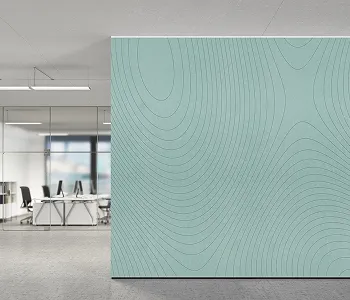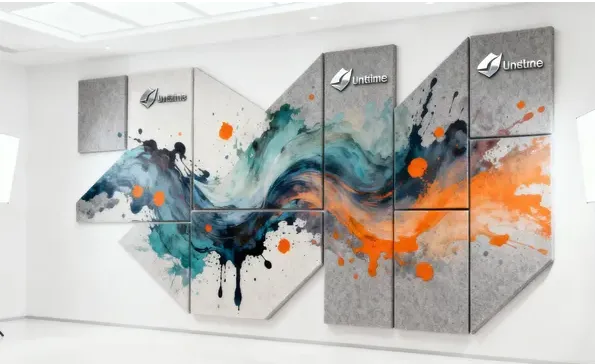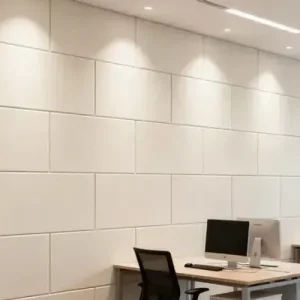Avoid your inquiry is delay response, please enter your WhatsApp/Skype along with the message, so we can contact you at the very first time.
We will reply you within 24 hours. If for urgent case, please add WhatsApp/WeChat: +86-13678899682 directly.
Rooms echo. Meetings tire people out. Music rooms and offices fight daily noise problems that blur words and detail. The fix is simple: specify a custom acoustic panel kit tuned for your space. It absorbs reflections and looks great—without tearing up walls.
Custom acoustic panels are sound-absorbing boards you design to fit your space—size, thickness, fabric, color, and even printed graphics. They improve sound quality by adding sound absorption, cutting reverb and echo, and making speech clearer. Panels mount on wall or ceiling surfaces and can be custom printed with branding or artwork to match interiors.
A panel is a framed absorber filled with high-performance core and wrapped in fabric. It works by turning sound energy into heat inside porous material. That sound absorption reduces the strength of reflections, trims reverb tails, and boosts speech clarity. When enough coverage is added, you’ll notice a calmer room and superior sound control.
To reduce noise efficiently, start with coverage equal to 15–25% of floor area in offices, 25–35% in classrooms, and 40–60% in studios. Place each acoustic panel where reflections are strongest—side walls, rear wall, and overhead ceiling clouds. You’ll absorb sound at the points that matter.
“When rooms are treated acoustically, people relax. Meetings speed up. Music translates.”

What is a custom acoustic panel
We build panels using durable PET felt, natural wood veneer faces, and classic fabric wrapped frames. PET is eco-friendly, lightweight, and stable; wood veneer gives a warm, aesthetic finish. Traditional fiberglass cores deliver excellent broadband absorption, while PET cores avoid itch and meet demanding projects.
Fabric wrapped acoustical designs remain the industry standard for corporate interiors. Many architects specify Guilford of Maine textiles for consistent dye lots, clean weave, and predictable acoustic performance. You can also select cotton-blend fabric or specialty acoustic fabric when branding or unique colorways matter.
What about acoustic foam? It helps at higher frequencies but can underperform below ~500 Hz compared with mineral or PET cores of similar thickness. For cinemas and music spaces, add low-frequency helpers like a bass trap in corners to tame modal buildup and reverb.
Your custom-printed face turns the panel into a sign, mural, or art wall. You can upload an image (or upload your brand logo) through our portal. For crisp edges, supply high resolution files at 150–200 pixels per inch (dpi) at final panel size. Preferred formats: png or print-ready PDFs.
Good layout practice: keep critical graphic elements at least 25 mm from edges; avoid hairlines under 1 pt; call out any different color requirements (Pantone or RAL). We’ll soft-proof, confirm print resolution, and send a visual for approval before production. Branded wayfinding, photo murals, and custom printed panels look sharp and professional.
Quick reference table
| Spec item | Recommendation |
| Minimum resolution | 150–200 dpi at final panel size |
| Safe margins | 25–30 mm inside the frame |
| File format | png or PDF/X |
| Color handling | CMYK; spot colors on request |
| Photo styles | Avoid heavy sharpening to prevent haloing |

Custom-printed graphics1
There are three standard approaches: Z-clips for tight mounting on wall surfaces, French cleats for long runs, and cable kits for ceiling clouds. Ceiling grids enable acoustic ceiling clusters over tables or open offices. We also supply magnetic kits for metal partitions.
Professional installation takes minutes per panel: fasten clips, hang, and level. In retrofit offices, panels are often installed after hours with no dust. For theaters and atriums, use threaded standoffs to create a shadow gap. Over glass, choose stand-offs or rails—clean, aesthetic, and safe.
Mounting safety notes:
In a studio, early reflection control and a gentle decay are the goals. Place acoustic panel pairs at side-wall mirror points, then add ceiling clouds above the mix position. A corner bass trap controls modes; two traps make a huge difference. This is effective treatment even in small rooms.
For a home theater, aim for even coverage along side and back walls. Keep the room lively enough for dialog and score warmth, but without slap echo. A blend of absorption and diffusion is ideal; your designer will balance acoustic treatment and finishes so it looks intentional and refined.
Want bold branding or gallery-grade imagery? Our panels combine print quality with tuned acoustics so the space reads clean and modern. We can include custom art series across multiple panels to span corridors and lobbies. Use texture, wood slats, or soft radius corners for a premium, decorative mood.
For a unique look, order panels with custom veneer faces and invisible edge returns. You can specify rounded corners, chamfers, or metal inlays. We can also combine PET and wood for a hybrid panel that looks architectural yet performs. The result is an aesthetic centerpiece that doesn’t shout “sound gear.”
Absorption is often listed as NRC (Noise Reduction Coefficient). NRC ~0.80–1.00 is typical for 25–50 mm thick acoustical wall panels. As thickness increases, low-frequency performance improves. For standards, see ASTM C423 and ISO 354.
Example absorption vs. thickness (typical)
| Thickness | NRC (typ.) |
| 25 mm | 0.80 |
| 40 mm | 0.90 |
| 50 mm | 0.95–1.00 |
Remember: coverage and placement matter more than chasing tiny NRC differences. One well-placed panel can transform how a conference table sounds; ten random panels won’t.
We also publish octave-band data so consultants can predict decay curves and manage buildup in the 125–250 Hz bands. That’s where voices get muddy. With the right plan, you get clean sound quality without over-deadening.
A 600-seat lecture hall had harsh reflections and high RT60. We mapped first reflections and added 120 m² of PET absorbers plus wood veneer clouds. Speech STI jumped from 0.48 to 0.65, and complaints vanished. Spaces like this transform your space from tiring to calm.
A retail rollout needed brand visuals and quiet fitting rooms. We produced a run of acoustic art panels that matched store palettes and delivered professional-grade sound in demo areas. Our engineer coordinated brackets with shopfitters so every panel aligned with millwork reveals, proving performance can be invisible.
Yes, we’ve seen spec sheets that name-drop others—ats acoustic panels, for example. The point isn’t a logo on a sheet; it’s a tuned package, verified on site, and delivered on schedule.
We supply color-fast fabric libraries (including the renowned guilford of maine) and curated veneers. You can theme a whole space with custom finishes that still perform.
As a China-based manufacturer of PET and wood systems, we support OEM/ODM with cut-to-fit programs, private labels, and carton marks for partners. Finishes include cotton-like weaves, technical knits, and veneers. Need UL/EN approvals? We’ll provide traceable lots and test data that specifiers appreciate.
We build premium details—flush edges, invisible seams, backed corners—that last under real use. Our PET is recycled and recyclable; wood is sourced responsibly; adhesives are low-VOC. That means durable absorbers that look right and keep your clients happy for years.
We typically recommend 25–50 mm cores for offices, thicker in music rooms, and mixed panel types in atriums. We’ll guide you through a quick survey and a layout that fits budget and look.

Where should panels go?
DIY note: Smaller rooms and rehearsal spaces can be handled by handy users. Pre-drill, check level, and follow the bracket map. For larger jobs, bring in a pro—safety first.
Material overview
| Material | Best use | Pros | Notes |
| PET felt | Offices, schools | Durable, clean edges | Great color range; easy to clean |
| Mineral core + fabric | Boardrooms, studios | Broad absorption | Pair with wood trims for executive rooms |
| Wood veneer face | Lobbies | Warm aesthetic | Perforations can help mid-band |
| Printed face | Branding walls | Mural + absorption | Verify proof before production |
Where panels shine
How many panels do I need for a mid-size office?
A simple rule is 20–30% coverage of floor area with 25–40 mm panels. We’ll model reflections and propose a balanced layout.
Can these panels be cleaned or repainted later?
PET and wrapped fabric faces clean with mild solutions. Printed faces can be dusted; avoid solvents.
Are they fire tested and safe for public projects?
Yes. We supply regional test reports and certificates per project.
Do you make ceiling clouds and baffles as well as wall panels?
Yes. Clouds, baffles, and slatted systems coordinate with wall absorbers for one visual language.
Can you match my brand colors and images?
Absolutely—send brand guides and approved files. We’ll proof and match before full production.
We’ve delivered panels to airports, healthcare, universities, and mixed-use towers—each with unique demands. Whether you want printed murals or warm wood, we tune the panel package so it looks intentional and works on day one. That’s the quiet confidence good design brings.
P.S. If you’re comparing catalogs and specs, remember: performance + finish + delivery is the winning trio. With the right panel, you get measurable results and a space that feels—and sounds—better from day one.